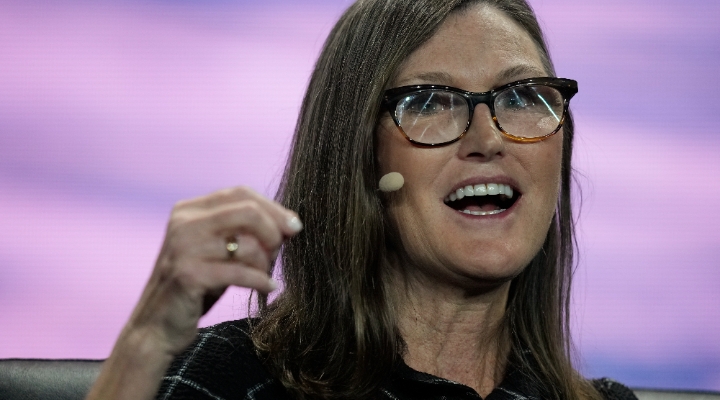:quality(80)/cloudfront-us-east-1.images.arcpublishing.com/morningstar/MNPB4CP64NCNLA3MTELE3ISLRY.jpg)
After a dismal 2022 and mostly stagnant 2023, the cryptocurrency market has roared back in 2024. Starting well below $1 trillion in market cap at the end of 2022, it has now soared past the $2 trillion mark. Bitcoin (BTC), the king of crypto, commands half of the total market value, driving this remarkable growth.
However, the asset classes’ volatility persists. Fortunately, investors averse to wild swings in crypto prices can still take part in the current rally without having to buy virtual assets.
A relatively safer way to gain exposure to the fast-growing asset class could be to own stocks of companies that are closely tied to the blockchain economy. Investors may want to look at the following names from the Morningstar coverage universe that provide indirect crypto exposure without the high inherent risks of cryptocurrency itself.
PayPal (PYPL) offers electronic payment solutions to merchants and consumers. The company had a staggering 426 million active accounts at the end of 2023. Focused primarily on online transactions, the firm also owns Venmo, a person-to-person payment platform.
Consumers can trade a range of cryptocurrencies, including Bitcoin, Bitcoin Cash, Ethereum, and Litecoin, on the PayPal platform. Recently, the online payments service became the first major U.S. financial company to launch its own U.S. dollar-backed regulated stablecoin, PayPal USD.
“PayPal remains a somewhat unique player within the payments space,” says a Morningstar equity report.
It cautions, though, that the firm’s position on both the merchant and consumer side could be challenged over the long run, but concedes that “in balance, the company can hold its own.”
An additional attraction is Venmo, the firm’s digital payment services platform that allows users to buy and sell crypto. “Efforts to monetize the platform are in still in the early stages and Venmo will likely not be a major driver anytime soon,” warns Morningstar equity analyst Brett Horn, who recently lowered the stock’s fair value from US$135 to US$104, prompted by assumptions of slower near-term growth.
Horn remains “optimistic on PayPal's long-term prospects,” and projects an 8% revenue growth over the next 10 years. In Q4, PayPal delivered robust performance, with revenue climbing 9% to US$8 billion, driven by substantial growth in total payments volume.
The Jack Dorsey-owned fintech firm Block (SQ) operates a bank, payments platform (Cash App), stock and crypto trading platform, among others. The San Francisco-based firm, formerly Square, also owns buy-now-pay-later provider Afterpay.
The company has a substantial exposure to the crypto market through bitcoin revenue generated from its trading platform and its own inventory of BTC. In 2023, Cash App generated US$205 million of bitcoin gross profit and US$9.50 billion of bitcoin revenue, up 31% and 34% year over year, respectively. With bitcoin ripping this year and flirting with a new all-time high, Block’s BTC-based profit and revenue could rise substantially.
“The company's effort to build out a consumer business surrounding its Cash App creates option value,” says a Morningstar equity report, but adds intense competition causes some uncertainty on this side of the business.
Nevertheless, Cash App's performance relative to its rivals has been strong, which indicates the company is positioning itself to be a dominant player in the space.
“We expect growth in the Cash App side to be stronger and for this area to be a more critical growth engine,” says Morningstar equity analyst, Brett Horn, who recently lowered the stock’s fair value to US$83 from US$98, due to recent weakness in profitability.
Overall, Square has seen dramatic growth over the years, nearing the point where it can generate attractive returns over time, he adds.
A leading derivatives exchange, CME Group (CME) trades futures and derivatives based on interest rates, equity indexes, foreign currencies, commodities, among others. The company owns 27% of S&P Dow Jones Indices, making CME the exclusive venue to trade and clear S&P futures contracts.
The firm also ranks as the biggest bitcoin futures trading platform, accounting for nearly 29% of all open interest, valued at US$9 billion, as of March 04.
Cryptocurrency futures allow investors to speculate on the future price of cryptocurrencies, through contractual agreements, without owning them directly.
CME's revenue is intricately tethered to the cryptocurrency market, as it provides Bitcoin and Ether futures and options on its platform.
“CME Group has enjoyed favorable market conditions in 2022 and 2023 as volatility across multiple asset classes drove increased trading volume, leading to strong revenue growth,” says a Morningstar equity report.
Before 2022, low short-term interest rates were negatively impacting the company's interest rate futures, its primary revenue source. When rates are low, there's less demand for hedging and speculation, dampening CME's trading volume.
“With interest rates now well above the 0% rate we saw during much of the past decade, the drag has been removed, benefiting the company's growth,” says Morningstar equity analyst, Michael Miller, who pegs the stock’s fair value at US$220 and forecasts annual growth rate of 4.2% from 2022 through 2027.
The company recently reported a staggering US$5.6 billion in revenue with US$3.2 billion in net income, the strongest year in its history.






:quality(80)/cloudfront-us-east-1.images.arcpublishing.com/morningstar/6ZMXY4RCRNEADPDWYQVTTWALWM.jpg)
:quality(80)/cloudfront-us-east-1.images.arcpublishing.com/morningstar/G3DCA6SF2FAR5PKHPEXOIB6CWQ.jpg)













